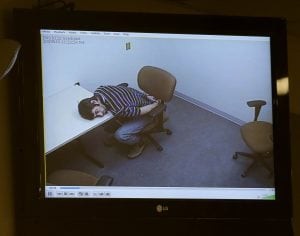Who Killed Chris Kyle And Why? WHY.EDU.VN delves into the tragic story of Chris Kyle’s death, exploring the complex circumstances surrounding the event and providing a comprehensive understanding. Uncover the motivations and contributing factors behind this devastating incident, offering insight into mental health, PTSD, and the aftermath.
1. The Tragic Death of Chris Kyle: Setting the Scene
Chris Kyle, renowned as the most lethal sniper in American military history, met a tragic end on February 2, 2013. The circumstances surrounding his death, and the identity of his killer, Eddie Ray Routh, have sparked widespread debate and speculation. Understanding the context of this event requires exploring the backgrounds of both Kyle and Routh, the events leading up to the shooting, and the subsequent legal proceedings. Chris Kyle’s legacy as an American hero and the complexities of Eddie Ray Routh’s mental state create a narrative that demands careful examination. Visit WHY.EDU.VN for more in-depth analysis and answers to your questions.
2. The Life and Legend of Chris Kyle
Christopher Scott Kyle (April 8, 1974 – February 2, 2013) was a United States Navy SEAL and the most decorated sniper in U.S. military history, with 160 confirmed kills out of 255 claimed kills. Kyle served four tours in the Iraq War and earned numerous commendations for his bravery and skill.
2.1. Military Career and Accomplishments
Kyle’s military career was marked by exceptional service and numerous awards, including:
- Silver Star Medal (5)
- Bronze Star Medal with Valor device (5)
- Navy and Marine Corps Achievement Medal (2)
His marksmanship and courage under fire made him a legend within the SEAL community.
2.2. American Sniper and Post-Military Life
After retiring from the Navy in 2009, Kyle wrote his autobiography, American Sniper, which became a bestseller and was later adapted into a successful film. He also dedicated himself to helping veterans suffering from PTSD, providing support and mentorship. This dedication made his death even more poignant, as he was killed while trying to help a fellow veteran.
2.3. The Hero Image and Public Perception
Kyle was widely regarded as a hero, both for his military service and his work with veterans. His image was carefully cultivated, and he became a symbol of American courage and patriotism. However, beneath the hero image, there were complexities and controversies that deserve consideration.
3. Eddie Ray Routh: The Killer’s Background
Eddie Ray Routh, a former U.S. Marine, struggled with severe mental health issues, including Post-Traumatic Stress Disorder (PTSD) and possible schizophrenia. His troubled past and deteriorating mental state played a crucial role in the events leading up to the shooting.
3.1. Military Service and Mental Health Struggles
Routh served in the Iraq War and later participated in a humanitarian mission in Haiti. These experiences appeared to have a profound impact on his mental health. After being discharged from the Marines, Routh exhibited signs of severe anxiety, paranoia, and psychotic episodes.
3.2. Diagnoses and Treatment
Routh was diagnosed with PTSD by the Dallas Veterans Affairs (VA) hospital and prescribed various medications, including anti-psychotics and anti-depressants. However, his condition continued to worsen, and he often stopped taking his medication, claiming it made him feel like a “fucking zombie.” The adequacy and effectiveness of his treatment have since been questioned.
3.3. Worsening Mental State
In the months leading up to Kyle’s murder, Routh experienced a series of psychotic breaks. He believed his coworkers were cannibals, that the government was spying on him, and that he was being targeted by unknown forces. These delusions and paranoia significantly impaired his judgment and ability to function.
4. The Events of February 2, 2013: The Day of the Shooting
On February 2, 2013, Chris Kyle and his friend Chad Littlefield took Eddie Ray Routh to a shooting range at Rough Creek Lodge in Erath County, Texas. The purpose of the trip was to provide Routh with support and camaraderie, and to help him cope with his PTSD. However, the day ended in tragedy.
4.1. The Trip to Rough Creek Lodge
Kyle had been contacted by Routh’s mother, Jodi, who was concerned about her son’s deteriorating mental state. Kyle, known for his willingness to help fellow veterans, agreed to take Routh to the shooting range, hoping that the activity would be therapeutic. Chad Littlefield, a friend of Kyle, accompanied them on the trip.
4.2. The Shooting and Its Aftermath
At the shooting range, Routh used Kyle’s weapons to shoot and kill both Kyle and Littlefield. The motive for the shooting remains unclear, but it is believed that Routh’s mental illness played a significant role. After the shooting, Routh fled the scene in Kyle’s truck, leading to a high-speed chase with law enforcement.
4.3. Routh’s Confession and Trial
Routh was eventually apprehended and charged with capital murder. During his trial, his defense team argued that he was insane at the time of the killings, suffering from paranoid schizophrenia. The prosecution, however, argued that Routh was a psychopath who knew what he was doing and should be held responsible for his actions.
5. The Legal Proceedings: Routh’s Trial and Verdict
The trial of Eddie Ray Routh garnered national attention, raising questions about mental health, accountability, and the treatment of veterans with PTSD. The legal proceedings were complex and emotionally charged.
5.1. The Insanity Defense
Routh’s defense team presented evidence of his severe mental illness, including testimony from a forensic psychiatrist who believed he was schizophrenic and suffered from paranoid delusions. They argued that Routh was unable to distinguish right from wrong at the time of the killings and should therefore be found not guilty by reason of insanity.
5.2. The Prosecution’s Case
The prosecution argued that Routh was not legally insane and that he knew what he was doing when he killed Kyle and Littlefield. They presented evidence that Routh had made statements indicating he understood the consequences of his actions and that he had attempted to evade capture after the shooting.
5.3. The Verdict and Sentencing
After deliberating for less than two hours, the jury found Eddie Ray Routh guilty of capital murder. He was sentenced to life in prison without parole. The verdict sparked mixed reactions, with some believing that justice had been served and others questioning whether Routh’s mental illness had been adequately considered.
6. Exploring the Motives: Why Did Routh Kill Chris Kyle?
Understanding the motives behind Routh’s actions requires delving into his mental state, his perceptions of Kyle, and the circumstances surrounding the shooting.
6.1. Routh’s Mental State and Perceptions
Routh’s mental illness significantly distorted his perceptions and judgment. He may have perceived Kyle as a threat or as part of a larger conspiracy. In his videotaped confession, Routh said, in reference to Kyle, “I knew if I did not take his soul, he was going to take mine.” This statement suggests that Routh may have been experiencing paranoid delusions and believed he was acting in self-defense.
6.2. The Role of PTSD and Other Mental Health Issues
PTSD, coupled with possible schizophrenia, likely contributed to Routh’s distorted thinking and violent behavior. The trauma he experienced during his military service may have triggered or exacerbated his mental health issues, leading to a breakdown in his ability to cope with reality.
6.3. Substance Abuse and Its Impact
Routh’s history of substance abuse, including alcohol and marijuana, may have further impaired his judgment and exacerbated his mental health symptoms. While the records say that he was not intoxicated when he arrived at the facility, substance abuse could necessitate a different treatment plan than one that occurs naturally.
7. The Aftermath: Grief, Reflection, and Controversy
The deaths of Chris Kyle and Chad Littlefield had a profound impact on their families, friends, and communities. The tragedy also sparked broader discussions about mental health, veterans’ care, and the glorification of violence.
7.1. The Impact on Families and Communities
The families of Kyle and Littlefield experienced unimaginable grief and loss. Their deaths were mourned by many, and memorial services were held to honor their lives and service. The tragedy also served as a reminder of the sacrifices made by military families and the challenges faced by veterans returning from war.
7.2. Discussions on Mental Health and Veterans’ Care
The case of Eddie Ray Routh highlighted the need for improved mental health care for veterans. Many veterans struggle with PTSD, depression, and other mental health issues, and they often face barriers to accessing timely and effective treatment. The VA has been criticized for its handling of Routh’s case, with some arguing that his mental illness was not adequately addressed.
7.3. Controversies and Alternative Perspectives
The narrative surrounding Chris Kyle’s death has been subject to controversy and alternative perspectives. Some have questioned the glorification of Kyle as a hero, pointing to his own struggles with PTSD and the potential for violence inherent in his profession. Others have criticized the media’s portrayal of Routh, arguing that he was unfairly demonized and that his mental illness was not given sufficient weight.
8. Mental Health and the Military: A Critical Examination
The intersection of mental health and military service is a complex and challenging issue that demands careful examination.
8.1. The Prevalence of Mental Health Issues in the Military
Military personnel are at a higher risk of developing mental health issues, including PTSD, depression, anxiety, and substance abuse. The stresses of combat, the trauma of witnessing violence, and the challenges of reintegrating into civilian life can all take a toll on mental well-being.
8.2. Challenges in Accessing and Receiving Treatment
Many veterans face barriers to accessing timely and effective mental health care. These barriers may include stigma, lack of awareness, limited resources, and bureaucratic hurdles. Even when veterans do seek treatment, they may encounter challenges in finding providers who are knowledgeable and experienced in treating military-related mental health issues.
8.3. The Role of the Veterans Affairs (VA)
The VA plays a crucial role in providing mental health care to veterans. However, the VA has been criticized for long wait times, inadequate staffing, and a lack of coordination between different departments. Efforts are underway to improve the VA’s mental health services, but more work needs to be done to ensure that all veterans have access to the care they need.
9. Chris Kyle’s Legacy: Beyond the American Sniper
Chris Kyle’s legacy extends beyond his military achievements and the American Sniper narrative. He was a complex figure who embodied both heroism and vulnerability.
9.1. Kyle’s Impact on Veterans’ Support
Kyle’s work with veterans suffering from PTSD had a significant impact on the veterans’ community. He provided support, mentorship, and a sense of camaraderie to those who were struggling to cope with the aftershocks of war. His dedication to helping others made him a respected and admired figure among veterans.
9.2. The Debate on Heroism and Violence
Kyle’s story has sparked a broader debate about the nature of heroism and the glorification of violence. While many view him as a hero for his military service and his dedication to helping veterans, others have questioned the morality of his actions in war and the potential for violence inherent in his profession.
9.3. Remembering Chris Kyle: A Balanced Perspective
It is important to remember Chris Kyle as a complex individual with both strengths and weaknesses. He was a skilled warrior, a dedicated veteran advocate, and a flawed human being. A balanced perspective acknowledges his accomplishments while also recognizing the complexities and controversies surrounding his life and death.
10. Lessons Learned: Preventing Future Tragedies
The tragic deaths of Chris Kyle and Chad Littlefield offer valuable lessons about mental health, veterans’ care, and the need for greater understanding and compassion.
10.1. The Importance of Early Intervention and Treatment
Early intervention and treatment are crucial for preventing mental health issues from escalating into crises. Identifying and addressing mental health symptoms early on can improve outcomes and reduce the risk of violent behavior.
10.2. Addressing Stigma and Promoting Awareness
Stigma surrounding mental health can prevent individuals from seeking help. Addressing stigma and promoting awareness can encourage more people to come forward and access the care they need.
10.3. Fostering Understanding and Compassion
Fostering understanding and compassion for those struggling with mental health issues can create a more supportive and inclusive society. Recognizing the challenges faced by veterans and providing them with the resources they need to thrive can help prevent future tragedies.
11. FAQ: Understanding the Chris Kyle Tragedy
| Question | Answer |
|---|---|
| Who was Chris Kyle? | Chris Kyle was a U.S. Navy SEAL and the most decorated sniper in American military history, known for his service in the Iraq War and his autobiography, American Sniper. |
| Who killed Chris Kyle? | Eddie Ray Routh, a former U.S. Marine struggling with PTSD and other mental health issues, was convicted of killing Chris Kyle and Chad Littlefield. |
| Why did Eddie Ray Routh kill Chris Kyle? | Routh’s motives remain unclear, but his severe mental illness, including paranoid delusions and possible schizophrenia, likely played a significant role in the shooting. |
| What was Routh’s mental state at the time of the shooting? | Routh was experiencing a severe psychotic break, characterized by paranoia, hallucinations, and distorted thinking. He may have perceived Kyle as a threat or as part of a larger conspiracy. |
| Was Routh found guilty of murder? | Yes, Routh was found guilty of capital murder and sentenced to life in prison without parole. |
| Did Routh claim insanity? | Yes, Routh’s defense team argued that he was insane at the time of the killings and should be found not guilty by reason of insanity. However, the jury rejected this defense. |
| What role did PTSD play in the tragedy? | PTSD, coupled with possible schizophrenia, likely contributed to Routh’s distorted thinking and violent behavior. The trauma he experienced during his military service may have triggered or exacerbated his mental health issues. |
| What was Chris Kyle doing with Eddie Ray Routh on the day of the shooting? | Kyle was trying to help Routh cope with his PTSD by taking him to a shooting range. Kyle was known for his willingness to support fellow veterans struggling with mental health issues. |
| What has been the impact of Chris Kyle’s death? | Kyle’s death had a profound impact on his family, friends, and the veterans’ community. It also sparked broader discussions about mental health, veterans’ care, and the glorification of violence. |
| What lessons can be learned from this tragedy? | The tragedy highlights the importance of early intervention and treatment for mental health issues, addressing stigma, promoting awareness, and fostering understanding and compassion for those struggling with mental illness. |


12. Conclusion: A Complex Tragedy, Enduring Questions
The death of Chris Kyle is a complex tragedy with enduring questions. While Eddie Ray Routh was held accountable for his actions, the circumstances surrounding the shooting raise important issues about mental health, veterans’ care, and the challenges of reintegrating into civilian life. Understanding the full picture requires considering the backgrounds of both Kyle and Routh, the events leading up to the shooting, and the broader social and political context.
Are you seeking answers to complex questions? Do you need expert insights on challenging topics? At WHY.EDU.VN, we provide detailed, easy-to-understand answers backed by expert knowledge. Our platform is designed to help you explore a wide range of subjects, from historical events to scientific discoveries. Visit us at why.edu.vn, located at 101 Curiosity Lane, Answer Town, CA 90210, United States, or contact us via Whatsapp at +1 (213) 555-0101. Ask your questions and discover the answers you’ve been searching for today!
